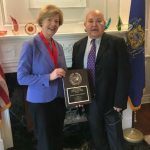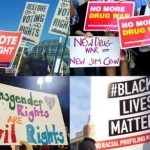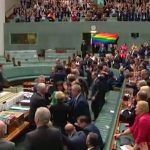
What is our obligation during teachable moments? When we witness misconceptions or a complete lack of understanding about the LGBTQ community, sexuality or gender, are we – as members of that community – obligated to speak up and educate? Does our firsthand experience and knowledge create some unspoken commitment, or are we allowed to hold others to a higher standard and ask that they be proactive in self-education?
With our feet dangling in the hot tub, my husband, friend and I pondered these questions. A gay man, queer woman and bisexual trans man – we were three people whose identities and desire for something better pushed us to educate. We couldn’t help ourselves. Refusing to continue living in a misinformed world, we strove to turn moments others may shy away from into true educational opportunities.
For my husband, the drive stemmed from over two decades of his life spent in an oppressive church environment where he was told what to do, how to live and who to be. With a past filled with skewed views and outright lies, the truth became his beacon. For my friend, a core of kindness, lifetime of experience and pride in his community made his voice rise up when others were afraid to speak. Within my heart, there lies a fiery advocate, eager teacher and educated social worker.
None of us could stay quiet if we wanted to, particularly when the offending parties were members of our own community. My husband shared a story about a lesbian who attacked his gender identity and wouldn’t allow a space for discussion, since she was gay and claimed not to need his education. My friend expressed his outrage over a gay male friend of his who vented on social media about the community’s acronym getting “too big” and questioning why gender was included. From queer friends to strangers on the street, everyone could use a little education.
Our audiences weren’t always receptive in the way we hoped. We vented over the frustrating times when someone would ask a question that was phrased with an air of genuine desire to learn but rooted in insensitivity and thoughtlessness. The worst moments were those when we took the time to answer someone’s question, only to be met with a dismissing attitude or never see the knowledge applied in action.
The day after our talk, I watched a news report about an elementary teacher who read children’s books to her class about transgender children, in order to begin creating a foundation of knowledge and make the classroom a safer space for a transgender peer. The action was met with outrage from the parents, who claimed to want to “own that narrative” but likely meant eliminate it. If a space that is specifically designed to educate cannot freely do so, isn’t that even more of a reason to transform everyday moments into teachable moments?
By stepping into a space of vulnerability and openness, our stories and experiences have the possibility to move and transform others. We may not be able to change people completely, but we can start to challenge toxic beliefs and instill some much-needed humanity. In these moments, we exist in hope. The education of others has the possibility to create allies and, even more ideally, advocates.
Do we have an obligation in these moments? No, but that shouldn’t stop us from speaking up. On the contrary, this lack of obligation should light a fire under us. We have the chance to create a better culture, where knowledge about our community is the norm and questions are posed from a place of genuine desire to learn and grow.
Particularly in this time of heightened oppression, our community must speak up. This is a time when silence is harmful. We must educate others, though we must first educate ourselves. So the next time a moment presents itself, follow the advice of my friend and “do better.”















